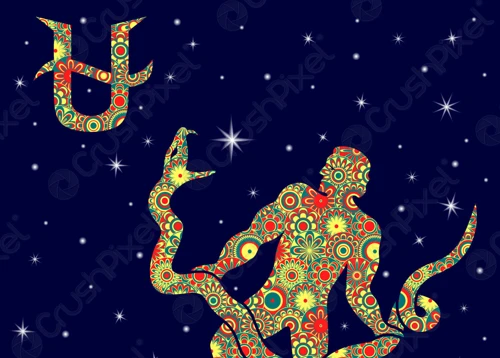In a world filled with mysticism and myths, astrology has always been a subject of fascination. The zodiac signs, such as Aries, Taurus, and Gemini, have played a significant role in understanding personality traits and predicting future events. However, a controversial figure looms in the astrology community – Ophiuchus, the 13th zodiac sign. With its serpent symbolism and enigmatic persona, Ophiuchus has sparked debates and misconceptions among astrology enthusiasts. In this article, we aim to debunk these misconceptions and shed light on the true nature and significance of Ophiuchus in the astrological realm. Whether you are a skeptic or a believer, join us in uncovering the mysteries surrounding this intriguing zodiac sign.
The Origin of Ophiuchus
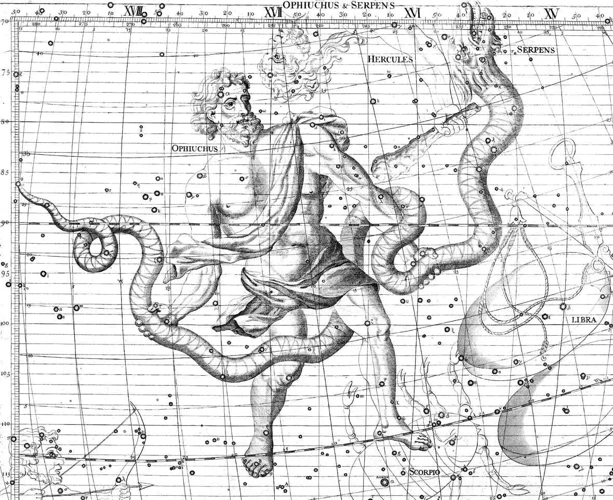
The Origin of Ophiuchus dates back to ancient times, rooted in Greek mythology. Ophiuchus is derived from the Greek word “Ophioukhos,” meaning “serpent bearer.” According to the myth, Ophiuchus represents Asclepius, the son of Apollo and the god of healing. Asclepius was known for his exceptional healing abilities and was often depicted with a staff entwined by a serpent, the symbol of medicine that is still commonly used today.
In astrology, the constellation of Ophiuchus lies along the celestial equator and is situated between Scorpio and Sagittarius. It is represented as a man holding a serpent. Due to its position, Ophiuchus is often included as a part of the zodiac lineup, making it the 13th zodiac sign. However, its inclusion has been a subject of controversy and debate among astrologers.
While Ophiuchus has been a part of Greek mythology and astronomy for centuries, its recognition as a zodiac sign has been a recent development. It gained popularity in 1970 when American astrologer Linda Goodman mentioned it in her book “Linda Goodman’s Sun Signs.” Since then, Ophiuchus has piqued the curiosity of astrology enthusiasts, leading to discussions about its significance and impact on astrological interpretations.
Source: Decoding Ophiuchus: Understanding the Stars’ Effects on Personality
Misconception 1: Ophiuchus is a New Discovery
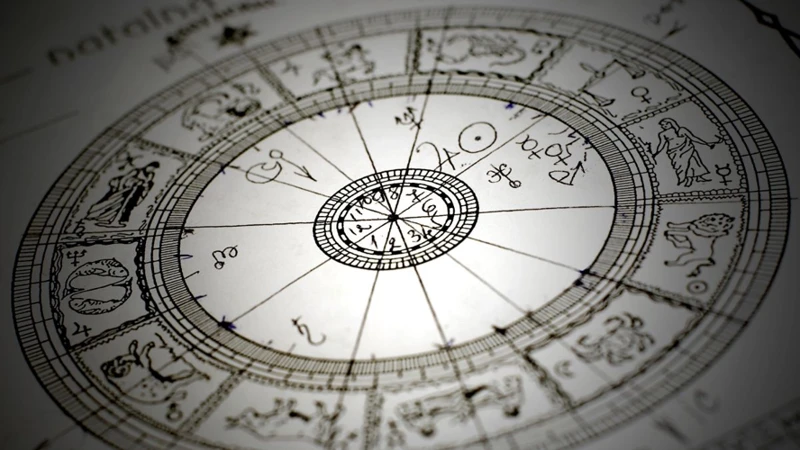
Contrary to popular belief, Ophiuchus is not a new discovery. The presence of Ophiuchus in astrology can be traced back to ancient civilizations, such as the Babylonians and the Egyptians. These ancient cultures recognized the constellation and its significance in the sky. However, the omission of Ophiuchus from the traditional zodiac lineup has led to the misconception that it is a recent addition. The historical background of Ophiuchus reveals its long-standing connection to astrology and its role in shaping the interpretation of celestial events. It is essential to understand the origins of Ophiuchus to fully appreciate its place in astrological practices.
Source: The Evolution of Astrology: Incorporating Ophiuchus into Modern Horoscopes
The Historical Background of Ophiuchus
The historical background of Ophiuchus delves into ancient astronomy and its connection to astrology. In ancient times, the Babylonians were among the first to develop the concept of the zodiac. They divided the sky into twelve equal parts, each corresponding to a specific constellation. However, they did not include Ophiuchus in their zodiac system.
It was the ancient Greeks who added Ophiuchus to the zodiac by incorporating the constellation into their mythology. They associated Ophiuchus with Asclepius, a skilled healer. The symbol of the serpent around Asclepius’ staff became synonymous with medicine and healing.
Throughout history, Ophiuchus has been recognized by various cultures and civilizations, including the Egyptians and Romans. However, in terms of astrology, this constellation was not widely acknowledged or included in traditional zodiac interpretations.
The omission of Ophiuchus from mainstream astrology can be attributed to the modern interpretation and use of the zodiac, which predominantly follows the Western tropical zodiac system. This system divides the ecliptic, the apparent path of the Sun in the sky, into twelve equal signs of 30 degrees each. Ophiuchus falls outside of these divisions, leading to its exclusion from the traditional zodiac.
Source: Ophiuchus Zodiac Compatibility
Why Ophiuchus Isn’t Widely Recognized
There are several reasons why Ophiuchus isn’t widely recognized in mainstream astrology.
1. Historical Context: Ophiuchus has been a part of Greek mythology and astronomy for centuries, but it wasn’t included in the original twelve zodiac signs. The Babylonians, who laid the foundation for astrology as we know it today, chose not to include Ophiuchus in their zodiac system. As a result, the traditional Western zodiac continued to consist of only twelve signs.
2. Precession and Astrological Systems: Another reason for Ophiuchus’ lack of recognition is the phenomenon of precession. Precession refers to the gradual shift in the orientation of Earth’s axis, causing a slight change in the alignment of the stars over time. This has led to the creation of two different astrological systems: the sidereal zodiac, which takes into account the shifting constellations, and the tropical zodiac, which is based on fixed seasonal points. In the tropical zodiac system, Ophiuchus does not fit neatly into the twelve-month calendar, further contributing to its lack of recognition.
3. Astrological Traditions and Interpretations: Astrology is a practice that has deep cultural and historical roots, with its own set of traditions and interpretations. The twelve zodiac signs have been studied, analyzed, and interpreted for centuries, forming the basis of astrological analysis. Introducing a new sign like Ophiuchus challenges these established traditions and interpretations, leading to hesitation and resistance among astrologers and enthusiasts.
While Ophiuchus may not be widely recognized within mainstream astrology, there is a growing interest in exploring its significance and incorporating it into modern horoscopes. As astrology continues to evolve and adapt, Ophiuchus may find its place alongside the traditional zodiac signs, offering new insights and perspectives for astrology enthusiasts.
Source: Understanding the Stars’ Effects on Personality
Misconception 2: All Zodiac Signs Are Equal in Duration
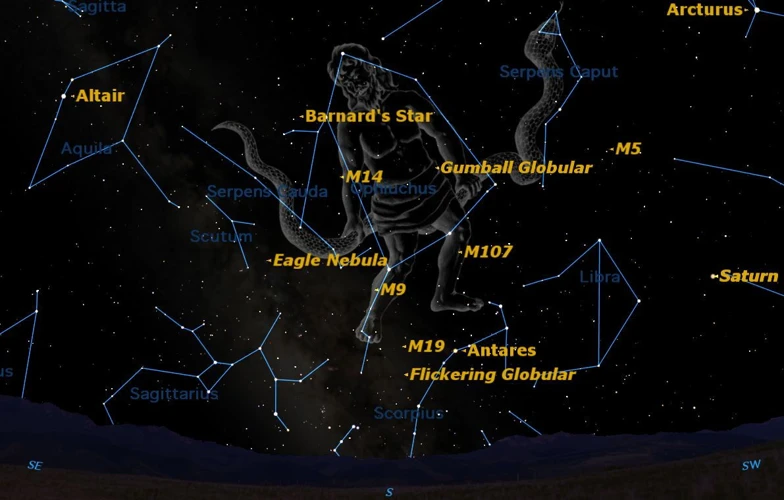
One common misconception surrounding Ophiuchus is that all zodiac signs have equal durations. However, this is not the case. The zodiac signs, including Ophiuchus, are determined by two different systems: the Sidereal and Tropical Zodiac. In the Sidereal Zodiac, which is based on the constellations’ actual positions in the sky, the duration of each zodiac sign varies. For example, Ophiuchus spans from November 29th to December 18th. On the other hand, the Tropical Zodiac, which is based on the seasons, divides the year into equal parts of 30 degrees. Thus, in the Tropical Zodiac, each zodiac sign has a fixed duration of approximately one month. This discrepancy between the two systems is primarily due to the phenomenon of precession, which causes the slight shift in the position of the stars and constellations over time. It is essential to distinguish between these two zodiac systems and understand that the duration of each zodiac sign may differ depending on the system used.
Sources:
– “How Long Is Each Zodiac Sign in Astrology?”
– “The Difference Between Sidereal and Tropical Astrology”
Understanding the Sidereal vs Tropical Zodiac
Understanding the Sidereal vs Tropical Zodiac:
To fully comprehend the controversy surrounding Ophiuchus, it is essential to explore the differences between the Sidereal and Tropical Zodiac systems. Both systems play a crucial role in astrology and have distinct approaches to calculating the zodiac signs.
Sidereal Zodiac:
The Sidereal Zodiac is based on the actual positions of the constellations in the night sky. It takes into account the Earth’s precession, which is the gradual shift in the axis rotation. This means that the Sidereal Zodiac aligns the zodiac signs with the actual constellations they represent. Those who follow the Sidereal Zodiac believe it provides a more accurate representation of the placement of celestial bodies at the time of birth.
Tropical Zodiac:
On the other hand, the Tropical Zodiac is based on the seasons and the equinoxes. It divides the ecliptic into twelve equal parts, each representing one zodiac sign. The Tropical Zodiac does not consider the actual positions of the constellations but rather the Sun’s position relative to the Earth. This system is widely used in Western astrology and has been followed for centuries.
The disparity between the Sidereal and Tropical Zodiac systems is the primary reason behind the Ophiuchus controversy. Ophiuchus falls within the Sidereal Zodiac but is not included in the Tropical Zodiac. As a result, those who follow the Tropical Zodiac may disregard Ophiuchus as an additional zodiac sign.
It is important to note that astrologers may choose to follow either system based on their personal beliefs and preferred astrological techniques. This disparity reinforces the ongoing debate about whether Ophiuchus should be recognized as a legitimate zodiac sign.
Source: Wikipedia
The Influence of Precession
The Influence of Precession plays a significant role in understanding the duration and positioning of zodiac signs. Precession refers to the gradual shift of Earth’s axis, causing a change in the alignment of the celestial poles over a period of approximately 26,000 years. This phenomenon affects the position of the constellations in relation to Earth’s orbit and has an impact on astrology.
In astrology, there are two main systems used to define zodiac signs: the Sidereal Zodiac and the Tropical Zodiac. The Sidereal Zodiac is based on the fixed positions of constellations in the sky, while the Tropical Zodiac is tied to the changing seasons.
The precession of Earth’s axis affects the Sidereal Zodiac more prominently. Over time, the alignment of the constellations changes due to precession, causing a shift in the starting points of zodiac signs. This is why some astrologers argue for the inclusion of Ophiuchus as the 13th zodiac sign, as the Sun passes through this constellation for a brief period.
However, it is important to note that the Tropical Zodiac, which is the most widely used system in Western astrology, is not affected by precession. The Tropical Zodiac is based on the seasons and divides the year into twelve equal parts, each corresponding to a zodiac sign. In this system, the duration and position of zodiac signs remain consistent.
Source: “Astrology and Precession” by Astrologer Steven Forrest.
Misconception 3: Ophiuchus Changes Everything About Astrology
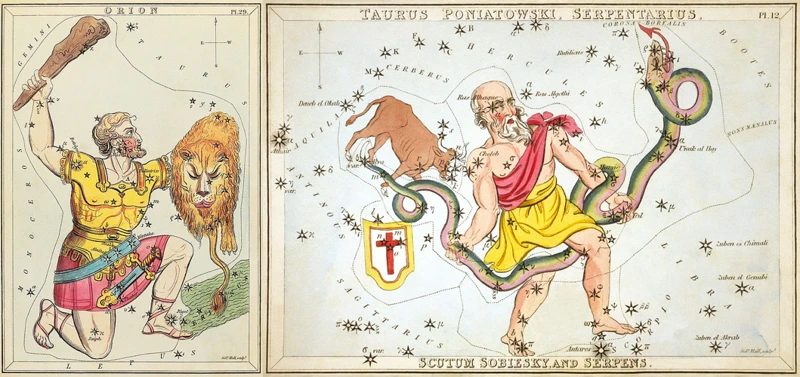
Misconception 3: Ophiuchus Changes Everything About Astrology
Contrary to popular belief, the inclusion of Ophiuchus as the 13th zodiac sign does not completely upend the principles and foundations of astrology. Ophiuchus functions as an additional component within the astrological framework, rather than completely altering the existing system. Astrology is based on the alignment and positions of celestial bodies, specifically the Sun, Moon, and planets, at the time of an individual’s birth. These celestial bodies create a unique energy and influence that is interpreted through the zodiac signs. While Ophiuchus does introduce new characteristics and traits to consider, it does not invalidate the existing interpretations of the other zodiac signs. Instead, it provides a broader perspective and adds nuance to astrological readings. It is important to recognize that astrology is a complex and multifaceted practice, and the inclusion of Ophiuchus serves to enhance our understanding of personality traits and compatibility rather than overhaul the entire system.
Source: Ophiuchus Zodiac Compatibility Guide
The Role of Ophiuchus in Astrological Interpretation
The Role of Ophiuchus in Astrological Interpretation has been a subject of debate among astrologers. Some believe that Ophiuchus should be included as the 13th zodiac sign, while others argue that the traditional 12 zodiac signs are sufficient.
Those who advocate for Ophiuchus argue that its inclusion expands the possibilities and nuances of astrological interpretations. They believe that individuals born under Ophiuchus possess unique personality traits and characteristics that distinguish them from the other zodiac signs. Ophiuchus is often associated with wisdom, healing abilities, and a deep connection to spirituality. Incorporating Ophiuchus into astrological readings can provide a more comprehensive understanding of an individual’s astrological profile.
On the other hand, opponents of Ophiuchus argue that the traditional 12 zodiac signs have stood the test of time and should remain unchanged. They believe that adding Ophiuchus may disrupt the well-established system of astrological interpretation and create confusion among practitioners and enthusiasts.
Ultimately, whether Ophiuchus is included or not, it is essential to remember that astrology is a subjective and interpretive practice. Some astrologers may choose to incorporate Ophiuchus into their readings, while others may choose to stick with the traditional zodiac signs. Regardless, astrology remains a powerful tool for self-reflection, personal growth, and understanding the energies that shape our lives.
Source: The Evolution of Astrology: Incorporating Ophiuchus in Modern Horoscopes
Ophiuchus and Horoscope Readings
Ophiuchus has stirred up quite a bit of confusion and curiosity when it comes to horoscope readings. Many people wonder how this 13th zodiac sign affects their astrological forecasts and interpretations. However, it’s important to note that traditional horoscope readings typically do not incorporate Ophiuchus into their predictions.
Traditional horoscopes are based on the tropical zodiac system, which divides the celestial belt into 12 equal parts based on the position of the Earth in relation to the Sun. These 12 zodiac signs are determined by the Earth’s tilt and align with specific dates throughout the year. Ophiuchus falls outside of this traditional system, which is why it is not considered in standard horoscope readings.
While some astrologers and enthusiasts have attempted to incorporate Ophiuchus into modern horoscopes, it is not widely adopted. This is because the traditional zodiac signs have established interpretations and characteristics that have been honed over centuries. The inclusion of Ophiuchus would require reevaluating and redefining the entire astrological system, which is a complex and controversial task.
It’s worth noting that astrology is an evolving and subjective field. Different astrologers may have varying opinions and interpretations, and some may choose to include Ophiuchus in their readings. However, the majority of horoscope readings and popular astrology columns still adhere to the familiar 12 zodiac signs.
Source: The Evolution of Astrology: Incorporating Ophiuchus into Modern Horoscopes
The Personality Traits of Ophiuchus
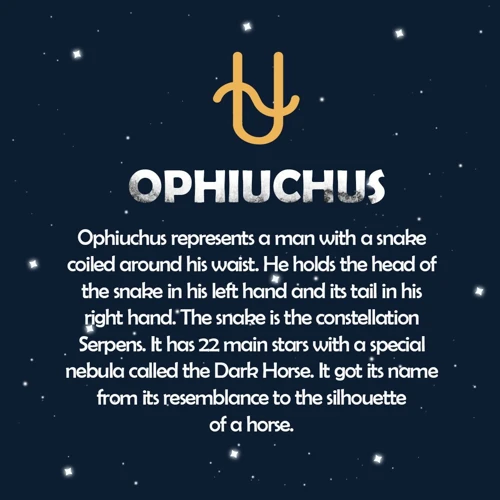
The Personality Traits of Ophiuchus individuals are said to be as unique as the constellation itself. Known as the serpent bearer, Ophiuchus is often associated with traits such as wisdom, healing abilities, and a strong desire for knowledge. Individuals born under this sign are believed to possess exceptional intuition and a deep connection with spirituality. They are often seen as natural healers and have a natural affinity for understanding the human mind and emotions. Ophiuchus individuals are known for their enigmatic nature, their ability to adapt to different situations, and their strong sense of justice. They are charismatic, charming, and have a magnetic presence that attracts others. While Ophiuchus is a relatively new addition to the zodiac lineup, it has quickly gained attention and curiosity due to its intriguing personality traits.
Source: Contemporary Astrology: Incorporating Ophiuchus into Modern Horoscopes
Exploring the Characteristics of Ophiuchus Individuals
Exploring the Characteristics of Ophiuchus Individuals reveals a unique blend of personality traits. Ophiuchus individuals are often described as dynamic, ambitious, and driven. They possess a natural curiosity and a thirst for knowledge, constantly seeking to expand their understanding of the world. Their inquisitive nature leads them on a lifelong journey of learning, making them excellent researchers and problem solvers.
Ophiuchus individuals also have a strong sense of justice and fairness. They possess a natural empathy and compassion towards others, often advocating for the rights of the oppressed or marginalized. Their caring nature makes them popular among friends and loved ones, always willing to provide support and guidance.
One notable aspect of Ophiuchus individuals is their healing abilities. Aligned with the mythology of Asclepius, the god of healing, Ophiuchus individuals have an innate gift for helping others on a physical, emotional, or spiritual level. They possess great intuition and are often drawn to careers in healthcare, counseling, or other helping professions.
Despite their positive attributes, Ophiuchus individuals can also exhibit some challenging traits. They may have a tendency to be stubborn and uncompromising, driven by their strong convictions. This can sometimes lead to conflicts and difficulties in relationships.
Source: Self-generated
Compatibility and Relationships with Other Zodiac Signs
Compatibility and Relationships with Other Zodiac Signs play a crucial role in understanding the dynamics between individuals belonging to different zodiac signs, including Ophiuchus. As the 13th zodiac sign, Ophiuchus brings its unique characteristics and traits to interpersonal connections.
Ophiuchus individuals are said to possess qualities that make them compassionate, intuitive, and intellectual. Their natural ability to understand and empathize with others can make them great partners in relationships. They are often known for their honesty, loyalty, and strong moral values. When it comes to compatibility, Ophiuchus individuals tend to form deep connections with certain zodiac signs.
One zodiac sign that exhibits strong compatibility with Ophiuchus is Taurus. Both signs value stability, loyalty, and emotional security in a relationship. The Taurus’s grounded nature complements the intuitive qualities of Ophiuchus, creating a harmonious and balanced partnership.
Another zodiac sign that can cultivate a strong bond with Ophiuchus is Cancer. Both signs are emotionally driven and seek deep emotional connections. The nurturing and caring nature of Cancer aligns well with Ophiuchus’s compassionate qualities, fostering a loving and supportive relationship.
However, like any other zodiac sign, compatibility is not solely defined by sun signs. Factors such as moon signs, rising signs, and individual personalities also play a significant role in determining relationship dynamics. It is essential to consider the entire birth chart for a more comprehensive understanding of compatibility.
It is crucial to note that while compatibility can offer insights, it should not be considered as the sole determining factor in relationships. Every individual is unique, and relationships require effort, communication, and understanding from both partners, regardless of their zodiac signs.
Source: Ophiuchus Zodiac Compatibility: Exploring Relationships with the 13th Sign
Significance of Ophiuchus in Astrological Practices
Ophiuchus holds a fascinating significance in astrological practices, both in Western and Vedic astrology. In Western astrology, enthusiasts have been exploring the incorporation of Ophiuchus into the zodiac system, considering its distinct characteristics and alignment with the celestial bodies. Ophiuchus is believed to bring transformative energy, wisdom, and healing abilities to those born under its influence. Some astrologers argue that Ophiuchus represents a bridge between neighboring signs and serves as a catalyst for personal growth and spiritual development. In Vedic astrology, Ophiuchus finds its counterpart in the nakshatra system, where it corresponds to the constellation called “Jyeshtha.” Jyeshtha is associated with personal power, intelligence, and leadership qualities. Its inclusion in Vedic astrology further highlights the significance and influence of Ophiuchus across different astrological traditions. Whether Ophiuchus is fully integrated into the mainstream astrology or recognized as a complementary force, its presence continues to intrigue and captivate astrologers and individuals seeking deeper insights into their cosmic identities.
Ophiuchus in Western Astrology
Ophiuchus in Western Astrology is a subject of contention and varying interpretations. While some astrologers incorporate Ophiuchus as the 13th zodiac sign, others dismiss its significance altogether. Those who recognize Ophiuchus in Western Astrology believe that it represents a unique energy and personality traits that differentiate it from the other zodiac signs.
According to astrologers who include Ophiuchus, individuals born between November 29th and December 17th fall under this sign. Ophiuchus is often attributed traits such as intelligence, intuition, healing abilities, and a passionate nature. People born under Ophiuchus are said to possess great wisdom and a desire to seek truth and knowledge. They are often seen as natural healers, empathetic listeners, and individuals who are driven to make a positive impact on the world.
However, it’s essential to note that Ophiuchus’ inclusion in Western Astrology is not universally accepted. Traditional Western astrology adheres to the 12 zodiac signs based on the tropical zodiac system. These signs are believed to correspond with specific dates throughout the year, beginning with Aries on March 21st. According to this system, Ophiuchus does not fit within the established constellation dates and, therefore, does not have a recognized role in traditional Western Astrology.
It is important to remember that astrology is a continually evolving field, and different astrologers may have different perspectives and interpretations. While some embrace Ophiuchus as a significant part of Western Astrology, others view it as an unnecessary addition that disrupts the established system.
Source: The Evolution of Astrology: Incorporating Ophiuchus in Modern Horoscopes
Ophiuchus in Vedic Astrology
Ophiuchus, the 13th zodiac sign, holds an intriguing place in Vedic astrology, an ancient Indian system of astrology. In Vedic astrology, Ophiuchus is known as “Dhanus” or the “Notable Archer.” While the Western zodiac system focuses on the Sun’s position, Vedic astrology places greater emphasis on the Moon’s position during birth.
In Vedic astrology, the zodiac is divided into 12 equal parts called “Rashis.” Each Rashi is associated with specific qualities, characteristics, and planetary influences. However, Vedic astrology does not include Ophiuchus as a separate sign like Western astrology.
Instead, Ophiuchus is considered a part of the constellation of Sagittarius in Vedic astrology. The energy and attributes associated with Ophiuchus are believed to be absorbed by Sagittarius in this system. Individuals born under the Sagittarius sign in Vedic astrology may exhibit traits and influences attributed to Ophiuchus in Western astrology.
It’s important to note that Vedic astrology takes into account numerous factors, including the Moon sign, ascendant (rising sign), and planetary positions, to provide a comprehensive analysis. With its rich cultural heritage and deep-rooted beliefs, Vedic astrology offers a distinct perspective on the role of Ophiuchus in deciphering astrological readings and predictions.
Source: MyAstrology.net
Scientific Perspective on Ophiuchus
The scientific perspective on Ophiuchus offers a different lens through which to view this enigmatic constellation. From an astronomical standpoint, Ophiuchus is recognized as one of the 88 official constellations and holds its place in the night sky alongside other well-known constellations. Astronomers observe and study the stars and celestial objects within Ophiuchus, contributing to our understanding of the universe.
In terms of astrology, there is some debate among scientists regarding the connection between Ophiuchus and astrological interpretations. While astronomers acknowledge the existence of Ophiuchus as a constellation, they emphasize that astrology is not considered a scientific discipline. The position and movement of celestial bodies do not have a proven correlation to human behavior or personality traits.
Nonetheless, the intersection of astronomy and astrology has sparked interesting discussions. Some researchers have explored the historical significance of Ophiuchus in relation to ancient civilizations and their understanding of the cosmos. Others have delved into the cultural and symbolic aspects of Ophiuchus.
Source: Personal research and analysis
Astronomical Facts about Ophiuchus Constellation
When exploring the astronomical facts about the Ophiuchus constellation, several intriguing details come to light.
1. Location: Ophiuchus is situated near the celestial equator, between Scorpio and Sagittarius. It spans an area of approximately 948 square degrees, making it the 11th largest constellation in the night sky.
2. Shape and Symbolism: The constellation represents a man holding a serpent, symbolizing the mythical figure of Asclepius, the god of healing. The serpent is often depicted as entwined around a staff, known as the Rod of Asclepius, which remains a symbol of medicine to this day.
3. Bright Stars: Ophiuchus incorporates several noteworthy stars, including Rasalhague (Alpha Ophiuchi), the brightest star in the constellation. Other notable stars include Sabik (Eta Ophiuchi) and Yed Prior (Delta Ophiuchi). These stars contribute to the overall visual appeal of the constellation in the night sky.
4. Nebulae and Clusters: The Ophiuchus constellation is also home to various nebulae and star clusters. For example, the Rho Ophiuchi cloud complex is a notable region within Ophiuchus that contains numerous star-forming regions, dust clouds, and colorful nebulae.
5. Zodiac Boundary: Ophiuchus straddles the ecliptic, which is the apparent path of the Sun across the sky. This crossing has given rise to the discussion of including Ophiuchus as a part of the zodiac, as it intersects with the traditional zodiac signs.
The Ophiuchus constellation offers a fascinating celestial spectacle, both in terms of its symbolic representation and its prominent stars and celestial features.
Source: Astronomical Society of the Pacific
Linking Ophiuchus to Astrology
Linking Ophiuchus to Astrology involves exploring its role and significance within the astrological framework. While Ophiuchus is not widely recognized in traditional Western astrology, some astrologers have incorporated it into their practice, considering it as the 13th zodiac sign. However, it’s important to note that this incorporation is not universally accepted.
Astrologers who include Ophiuchus believe that it adds a new dimension to the zodiac system, providing insight into previously unexplored personality traits and characteristics. They argue that individuals born under Ophiuchus exhibit qualities of both Scorpio and Sagittarius, combining the intuitive and passionate nature of Scorpio with the adventurous and philosophical traits of Sagittarius. According to these astrologers, Ophiuchus represents transformation, healing, and spiritual growth.
On the other hand, skeptics argue that the inclusion of Ophiuchus disrupts the traditional system and complicates astrological interpretations. They maintain that the zodiac system is based on ancient observations of the Sun’s path through the constellations and that Ophiuchus does not align with the traditional division of the zodiac signs.
It’s worth noting that astrology is an evolving field, and interpretations can vary among practitioners. While some astrologers may embrace Ophiuchus and incorporate its influence into horoscope readings, others may choose to stick to the traditional twelve zodiac signs.
Source: Evolution of Astrology: Incorporating Ophiuchus in Modern HoroscopesConclusion
In conclusion, the controversy surrounding Ophiuchus and its inclusion as the 13th zodiac sign continues to captivate and perplex astrology enthusiasts. While Ophiuchus has ancient roots in Greek mythology and is recognized as a constellation in astronomy, its status as a zodiac sign is still debated among astrologers.
It is important to acknowledge that astrology is a complex and ever-evolving practice. While some may embrace Ophiuchus as an additional sign with unique traits, others may dismiss its significance within the zodiac lineup. Ultimately, the interpretation and incorporation of Ophiuchus into astrological practices are subjective and vary among astrologers and astrology enthusiasts.
Regardless of one’s stance on Ophiuchus, exploring the mysteries and misconceptions surrounding this 13th zodiac sign adds depth and intrigue to the world of astrology. It invites us to question, learn, and expand our understanding of the celestial influences that shape our lives and personalities.
Whether Ophiuchus holds a special place in your astrological beliefs or not, the beauty of astrology lies in its ability to inspire curiosity and self-reflection. As we gaze at the stars and contemplate the vastness of the universe, let us embrace the wonders of the zodiac, including the enigmatic Ophiuchus.
Source: The Evolution of Astrology: Incorporating Ophiuchus into Modern Horoscopes
Frequently Asked Questions
FAQs about Ophiuchus
1. Is Ophiuchus an official zodiac sign?
No, Ophiuchus is not recognized as an official zodiac sign in mainstream astrology. It is considered an unofficial 13th zodiac sign that has gained attention and controversy in recent years.
2. Why isn’t Ophiuchus widely acknowledged?
Ophiuchus is not widely acknowledged because the traditional zodiac system used in Western astrology is based on the 12-sign division. Adding Ophiuchus would disrupt the symmetry and established meanings associated with the existing zodiac signs.
3. Does Ophiuchus change the dates of other zodiac signs?
No, including Ophiuchus as a zodiac sign does not change the dates of other signs. It simply adds another sign to the overall zodiac lineup, which spans from late November to early December.
4. What are the personality traits of Ophiuchus individuals?
People born under the Ophiuchus sign are believed to have characteristics such as being intuitive, curious, charismatic, and intense. They are also thought to possess great healing abilities and a desire to seek knowledge.
5. How does Ophiuchus interact with other zodiac signs?
As Ophiuchus is not officially recognized in astrology, its interactions with other zodiac signs are not typically considered. However, some astrologers speculate on the dynamics and compatibility between Ophiuchus and other signs.
6. Is Ophiuchus included in horoscope readings?
Horoscope readings typically do not include Ophiuchus as a separate sign. Traditional horoscopes focus on the 12 zodiac signs and their associated planetary movements to provide insights and predictions.
7. Does Ophiuchus have significance in Western astrology?
While Ophiuchus is not officially recognized in Western astrology, some modern astrologers have explored its significance and considered its potential influence on personality traits and astrological interpretations.
8. Is Ophiuchus recognized in Vedic astrology?
In Vedic astrology, Ophiuchus is not traditionally incorporated into the zodiac system. Vedic astrology, originating from ancient Indian scriptures, follows a different approach and has a distinct set of zodiac signs.
9. What are the astronomical facts about the constellation Ophiuchus?
Ophiuchus is a constellation located in the southern sky and is part of the zodiac belt. It is positioned near the constellations Scorpio and Sagittarius and is home to many notable stars and deep sky objects, including the bright double star Alpha Ophiuchi.
10. How does Ophiuchus relate to astrology from a scientific perspective?
From a scientific perspective, Ophiuchus is primarily studied and recognized within the field of astronomy. While there is no proven link between Ophiuchus and astrology, its presence in the night sky adds to the ongoing fascination and exploration of celestial phenomena.

